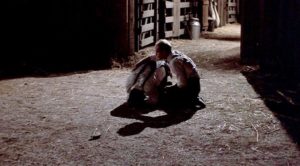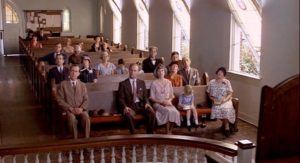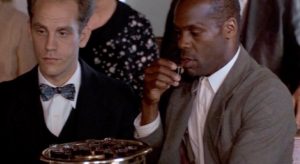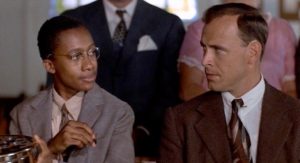Places in the Heart (1984). Written and directed by Robert Benton (Academy Award for Best Original Screenplay). Starring Sally Field (Academy Award for Best Actress), John Malkovich, and Danny Glover. PG, 111 min.
Finally, after travail upon travail, after tragic loss, everything finally looks like all will end happily, or least alright, for they fought circumstance and came to care deeply about each other, though a rag-tag bunch they were: blind, black, widowed, and fatherless. It seems indeed that the long melodrama of Places in the Heart will end okay. Edna Spalding (Sally Field) and her kids are off at the harvest dance, and meanwhile her new compatriots, Mr. Will (John Malkovich), a blind WWI veteran, and Moze (Danny Glover), an itinerant black farm worker, sit on the back porch chatting while Mr. Will canes chairs, as he does for his living. Bad luck and evil have been held at bay, or so we think.
When Will hears a noise in the distant barn, Moze goes to look and is there accosted by members of the Klan, for he has apparently offended white manhood. After all, a black man has helped a husbandless woman bring in the first cotton crop and thereby win a big cash prize. So they have come to beat him to death until, that is, blind Will intervenes with a pistol (he is a war vet, after all, and he has fetched the dead sheriff’s weapon) that he is more than willing to fire. They go running when the disarmed Will identifies each by their voices but not before promising Moze that they will return. In one of the film’s more arresting shots, one that director Benton protracts, Will kneels in the dust to comfort his beaten and heart-broken friend. Moses knows that as much as his body now hurts it hardly compares with the loss having to leave in order to protect his own life.

Such is the way of evil, smashing the intimacy and delight that God sees as the “right and good” way of being and for which God made this world. So Moze must leave his dearly loved friends, seemingly as much as a home as he has had in a long time, and flee into the night to only God knows where. Alas, this is not the usual Hollywood happy ending—and things do not change. Sort of.
What does happen is very likely one of the most surprising, remarkable, and profoundly Christian endings in all of cinema. And it shatters, as in obliterates, what we usually mean by “happy.” The sequence shifts to a sparsely attended church service, one attended by the Spalding family and Mr. Will.

The preacher reads the day’s text, I Corinthians 13, and then things go a little surreal. The choir then sings Fanny Crosby’s “In the Garden” (her “Blessed Assurance” plays over the long opening montage) as Communion elements are passed down the row and as the minister reads the words of instruction. Clearly, Benton must layer and compact here. Soon the camera follows row upon row in the now suddenly very FULL church. Following the tray full of small glasses that hold the wine is done in one long take (the crew took three weeks to construct the apparatus that allowed for the camera to manage that long take). We are surprised to see as we proceed down the pews the town prostitute, a woman who had been killed in a tornado earlier in the film, and others as well. While Benton needs to be economical, this device also serves wonderfully the religious purposes of the film, allowing finally for the stunning surprise that happens when the elements arrive at the last row where the Spalding family now sits (in the first shot of sequence they occupy fourth row from front).
The first shock is to find first in that row, of all people, Moze, the one who fled town to save his own life and, more than that, a man who would never ever have been allowed in a white church in 1930s rural Texas (and who in any event is seated not far from the KKK men). And he then serves Mr. Will, who then passes the tray on to the Spalding children, who also partake of the Feast.

A new element enters when for the first time in the passing of the wine (grape juice) young Frank is heard to say to himself “Peace of God” before he downs the juice. The tray passes to his mother, who repeats those words, again very much to herself. And she, alas, and surprise, passes it to her (dead) husband, who looks very much alive, and lo, he passes it to young Wiley (who had murdered the sheriff in the film’s opening scene and was lynched for doing so). But Wiley also looks very much alive, saying to him, “The peace of God.” And Wiley, bless him, turns to the slain sheriff to wish him “the peace of God.”

And such, in this perfect iconic representation is the kingdom of God. Not pearly gates and a love swoon with Jesus, but rather, creature love amid the heat, dust, blood, and tears in Texas dirt. So we see in terms as real as any we are ever likely get a family of God in the Kingdom of God. It is the peace of God, one that follows upon gratitude and love for all of God’s creatures, black, white, blind, homeless, fatherless, all the “leasts of” of the earth, for there lies the kingdom of God and the hope and “peace of God,” no matter how dark the “darkling plain” upon which human kind fusses, fumes, wars, and grieves. And here we witness the oneness of all, reconciled and loved within the lavish care of God, the kingdom made real, the dark glass gone and the Light, the beautiful Light, encompassing all. About this there is no scriptural ambiguity, plain and simple, and it really is the destination of the whole long story.
The peace of God. Indeed.
written by Roy Anker
Sign Up for Our Newsletter!
Insights on preaching and sermon ideas, straight to your inbox. Delivered Weekly!

Categorized into Kingdom
Places in the Heart (1984) – 3